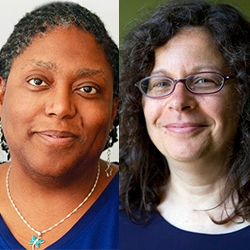

Search Results: conversation
-
- Witness these two visionaries engage with love, openness, and curiosity
- Explore open questions and curiosities you have about NVC
- Help support the ongoing sustainability of NVC Academy
- Expand your thinking within NVC and its relevance to our times
-
If role-play, hearing conversations modeled, and dialogue practice is how you learn, this 4-part telecourse recording is for you! Learn the art of entering into, staying in, and bowing out of “the dance” of communication, playing with your real-life situations using the four components of Nonviolent Communciation as the foundation.
-
Listen to Roxy Manning explore the barriers to speaking authentically as powerful voices for change, and practice these needed conversations about the ongoing violence in the streets of America.
-
Learn to speak NVC using your own voice and increase ease and flow in all your personal and professional conversations. This 7-session telecourse recording with renowned trainer Miki Kashtan is designed to help you integrate NVC into all aspects of your life by gaining fluency in your practice of NVC and by embodying the principles regardless of the words you use. This course is based on intensive practice and coaching with real-life examples from participants’ lives.
-
In this excerpt from Roxy Manning's 2019 Social Change session at the NVCfest, she explores the application of Nonviolent Communication (NVC) to address both immediate conflicts and broader systemic issues. She emphasizes the importance of intervening at multiple levels, from stopping harmful behavior in the moment to driving long-term societal change.
-
See how movement helps maintain center during challenging conversations with examples.
-
Join Itzel Hayward and Kathy Simon as they present two role-play scenarios showcasing diverse approaches to navigating difficult conversations. Throughout the demonstration, they underscore the significance of cultivating self-empathy and mindfulness to effectively engage in challenging dialogues. Specifically, they introduce a role-play scenario concerning affirmative action, aimed at illustrating the contrasting outcomes when utilizing or not utilizing nonviolent communication skills.
-
When deciding if someone crossed your boundaries and how to respond, you may get conflicting opinions on it. These opinions can be coarse attempts to manage life with rules about what should(n’t) happen. Instead, so that you can find where you want to invest your energy, ask yourself questions that reveal what for you is truly in integrity, nourishing, connects to your heart, and deepens self understanding. Read on for examples.
-
Ask the Trainer: Share a list of request types, examples, and a strategy for formulating them.
-
The less blame and criticism, the easier it is for others to hear us. From this perspective, it’s in our best interest to come from curiosity and care. This way differences can bring us together and help us know one another. The more mutual understanding, the easier it is to work together and find creative solutions. Read on for more on this, with a story about how a black man inspired 200 members of the KKK to leave the organization.
-
Listening is a cornerstone of dialogue and a powerful metaphor for spiritual practice. When we’re willing and able to listen, we open a conduit that allows connection and understanding to happen.
-
Use these cards in your practice group or NVC training to understand 4 different ways of responding to hard to hear messages. Become aware of the way you habitually respond to stimulus and develop skills to respond with empathy and express honestly.
-
Effective and connected dialogue requires significant self-awareness, mindfulness, and skill. You can focus on any of these six areas that most often escape your awareness: anchoring and staying grounded; boundaries; thoughts and beliefs; stuckness or attachment; feelings and needs; and requests. Read on for a list of questions to help you focus on how to do that.
-
Jeff shows us how to emply NVC to supercharge the possibility of transformation between two people in a mediation process.
-
Receiving anger from another can be a reactive trigger for many of us. In this brief segment, Arnina provides us a strategy for staying in the conversation instead of physically leaving.
-
A chosen, interdependent world… In most cases, that's sure not the world we live in today, is it. But it could be the world we live in tomorrow. And you can choose to be part of bringing that better world to life – to be part of a gradual, joyful transformation – simply by using the dynamic, living power of Dialogue.
-
- Explore how gender power dynamics impact everyday interactions
- Learn how to navigate these complexities with curiosity and compassion
- Gain the skills to build inclusive personal and professional environments
- Contribute to a world where every voice matters!
-
Trainer Tip: One of the swiftest ways to close our hearts is having judgmental thinking or looking to get our way. How open are you when you're in this mode? The goal in peaceful living is to approach our relationships with an open heart. Start conversations today with an intention to connect with other people.
-
In our internal conversations, some voices dominate others, which can leave us feeling fragmented or overwhelmed. But when we dive beneath the surface and really listen to our many parts, we connect vulnerably to our full humanity.
-

Quick Links
Subscription Preferences
Stay In Touch!
Looking for ways to keep up with NVC Academy news, get special offers, free resources, or words of inspiration? Here are five ways to stay engaged:



















